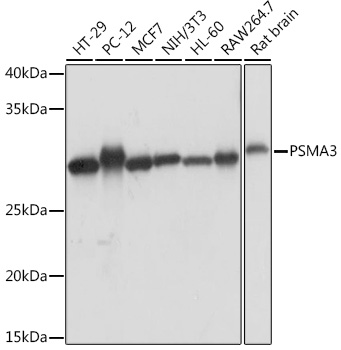Immunology Antibodies 3
Anti-PSMA3 Antibody (CAB5094)
- SKU:
- CAB5094
- Product Type:
- Antibody
- Reactivity:
- Human
- Reactivity:
- Mouse
- Reactivity:
- Rat
- Host Species:
- Rabbit
- Isotype:
- IgG
- Research Area:
- Immunology
Description
| Antibody Name: | Anti-PSMA3 Antibody |
| Antibody SKU: | CAB5094 |
| Antibody Size: | 20uL, 50uL, 100uL |
| Application: | WB IHC |
| Reactivity: | Human, Mouse, Rat |
| Host Species: | Rabbit |
| Immunogen: | A synthesized peptide derived from human PSMA3 |
| Application: | WB IHC |
| Recommended Dilution: | WB 1:500 - 1:2000 IHC 1:50 - 1:200 |
| Reactivity: | Human, Mouse, Rat |
| Positive Samples: | HT-29, PC-12, MCF7, NIH/3T3, HL-60, RAW264.7, Rat brain |
| Immunogen: | A synthesized peptide derived from human PSMA3 |
| Purification Method: | Affinity purification |
| Storage Buffer: | Store at -20'C. Avoid freeze / thaw cycles. Buffer: PBS with 0.02% sodium azide, 0.05% BSA, 50% glycerol, pH7.3. |
| Isotype: | IgG |
| Sequence: | Email for sequence |
| Gene ID: | 5684 |
| Uniprot: | P25788 |
| Cellular Location: | |
| Calculated MW: | 28kDa |
| Observed MW: | 28KDa |
| Synonyms: | HC8, PSC3 |
| Background: | The proteasome is a multicatalytic proteinase complex with a highly ordered ring-shaped 20S core structure. The core structure is composed of 4 rings of 28 non-identical subunits; 2 rings are composed of 7 alpha subunits and 2 rings are composed of 7 beta subunits. Proteasomes are distributed throughout eukaryotic cells at a high concentration and cleave peptides in an ATP/ubiquitin-dependent process in a non-lysosomal pathway. An essential function of a modified proteasome, the immunoproteasome, is the processing of class I MHC peptides. This gene encodes a member of the peptidase T1A family, that is a 20S core alpha subunit. Two alternative transcripts encoding different isoforms have been identified. [provided by RefSeq, Jul 2008] |
| UniProt Protein Function: | PSMA3: a proteasomal protein of the T1A peptidase family. The proteasome is a multicatalytic proteinase complex which is characterized by its ability to cleave peptides with Arg, Phe, Tyr, Leu, and Glu adjacent to the leaving group at neutral or slightly basic pH. Proteasomes are distributed throughout eukaryotic cells at a high concentration and cleave peptides in an ATP/ubiquitin-dependent process in a non-lysosomal pathway. Two alternatively spliced isoforms have been identified. |
| UniProt Protein Details: | Protein type:Proteasome complex; Protease; EC 3.4.25.1 Chromosomal Location of Human Ortholog: 14q23 Cellular Component: nucleoplasm; proteasome complex; proteasome core complex; cytoplasm; cytosol; nucleus Molecular Function:threonine endopeptidase activity; protein binding Biological Process: positive regulation of ubiquitin-protein ligase activity during mitotic cell cycle; negative regulation of ubiquitin-protein ligase activity during mitotic cell cycle; protein polyubiquitination; viral reproduction; apoptosis; antigen processing and presentation of exogenous peptide antigen via MHC class I, TAP-dependent; DNA damage response, signal transduction by p53 class mediator resulting in cell cycle arrest; regulation of apoptosis; antigen processing and presentation of peptide antigen via MHC class I; regulation of ubiquitin-protein ligase activity during mitotic cell cycle; anaphase-promoting complex-dependent proteasomal ubiquitin-dependent protein catabolic process; antigen processing and presentation of exogenous peptide antigen via MHC class I; gene expression; mitotic cell cycle; regulation of amino acid metabolic process; negative regulation of apoptosis; G1/S transition of mitotic cell cycle |
| NCBI Summary: | The proteasome is a multicatalytic proteinase complex with a highly ordered ring-shaped 20S core structure. The core structure is composed of 4 rings of 28 non-identical subunits; 2 rings are composed of 7 alpha subunits and 2 rings are composed of 7 beta subunits. Proteasomes are distributed throughout eukaryotic cells at a high concentration and cleave peptides in an ATP/ubiquitin-dependent process in a non-lysosomal pathway. An essential function of a modified proteasome, the immunoproteasome, is the processing of class I MHC peptides. This gene encodes a member of the peptidase T1A family, that is a 20S core alpha subunit. Two alternative transcripts encoding different isoforms have been identified. [provided by RefSeq, Jul 2008] |
| UniProt Code: | P25788 |
| NCBI GenInfo Identifier: | 130859 |
| NCBI Gene ID: | 5684 |
| NCBI Accession: | P25788.2 |
| UniProt Secondary Accession: | P25788,Q86U83, Q8N1D8, Q9BS70, B2RCK6, |
| UniProt Related Accession: | P25788 |
| Molecular Weight: | Calculated MW: 27kDa/28kDaObserved MW: 28kDa |
| NCBI Full Name: | Proteasome subunit alpha type-3 |
| NCBI Synonym Full Names: | proteasome (prosome, macropain) subunit, alpha type, 3 |
| NCBI Official Symbol: | PSMA3 |
| NCBI Official Synonym Symbols: | HC8; PSC3 |
| NCBI Protein Information: | proteasome subunit alpha type-3; macropain subunit C8; proteasome subunit C8; proteasome component C8; multicatalytic endopeptidase complex subunit C8 |
| UniProt Protein Name: | Proteasome subunit alpha type-3 |
| UniProt Synonym Protein Names: | Macropain subunit C8; Multicatalytic endopeptidase complex subunit C8; Proteasome component C8 |
| Protein Family: | Phenol-soluble modulin alpha 3 peptide |
| UniProt Gene Name: | PSMA3 |
| UniProt Entry Name: | PSA3_HUMAN |







